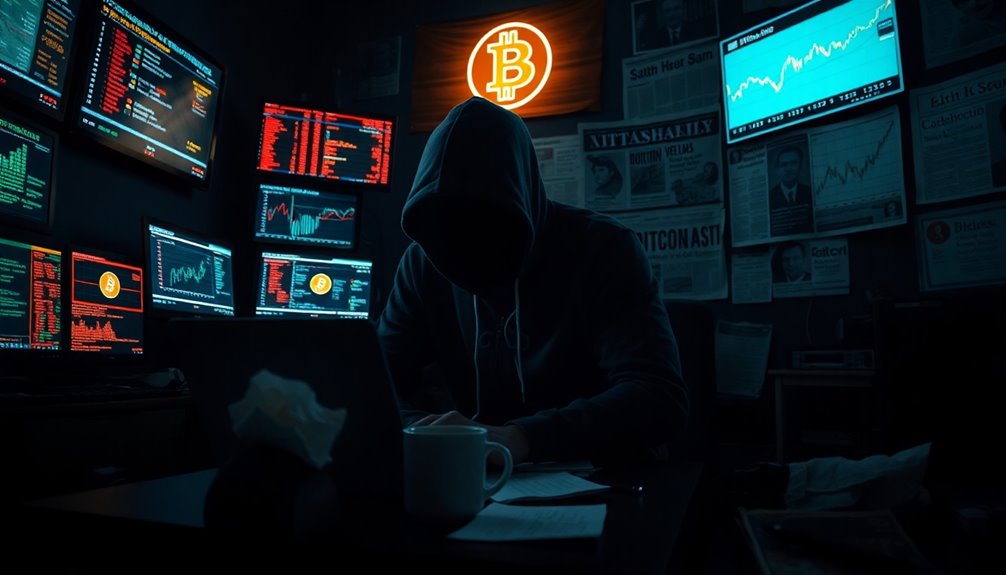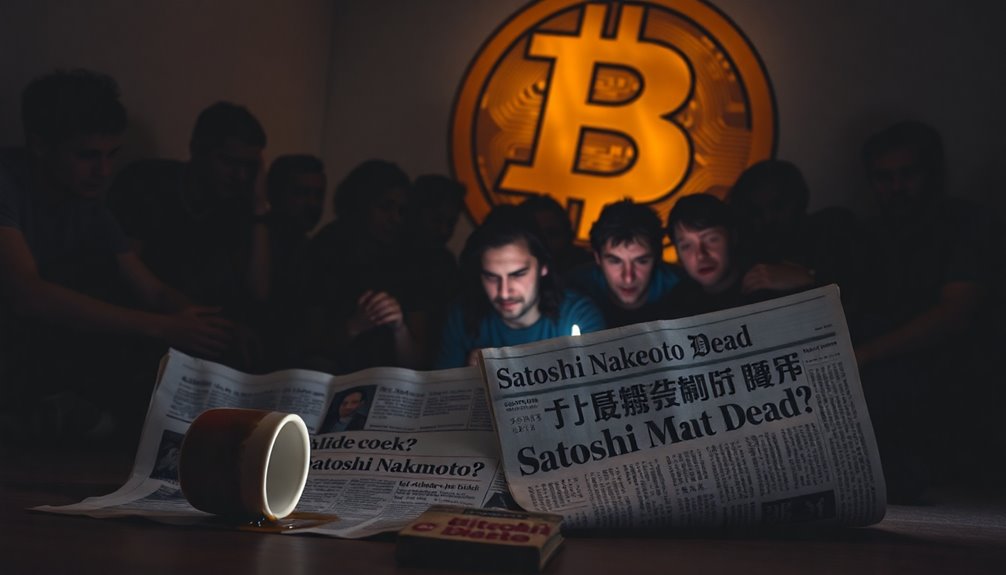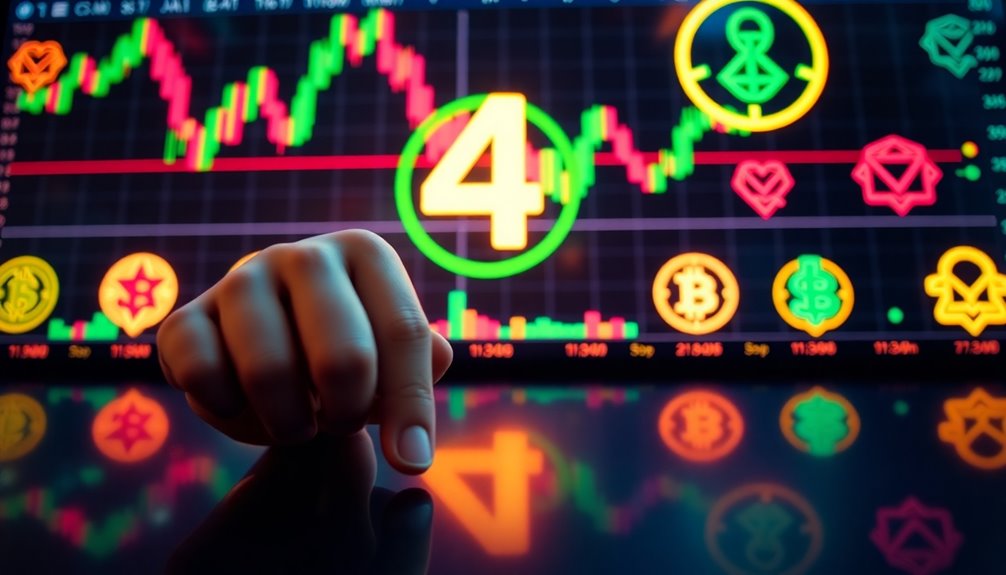Mike Novogratz's recent remarks have ignited a frenzy over the fate of Satoshi Nakamoto, stirring speculation that the Bitcoin creator may be dead. While various candidates have been suggested over the years, the true identity remains a mystery. Approximately 1.1 million Bitcoins are still untouched, raising more questions about Satoshi's status. The crypto community's fascination with this enigma only adds to Bitcoin's allure as a digital store of value. If you're curious about how these developments might impact Bitcoin and the broader crypto landscape, you might find the subsequent details interesting.
Key Takeaways
- Novogratz suggested Satoshi Nakamoto may not be alive, raising concerns about Bitcoin's future and its appeal as a store of value.
- The mystery of Satoshi's identity continues to intrigue the cryptocurrency community, with various candidates speculated but no definitive proof.
- Speculation about Satoshi's possible death could challenge Bitcoin's decentralized image, affecting market sentiment and investor confidence.
- The allure of Satoshi's mystery adds charm to Bitcoin's narrative, reflecting ongoing engagement and folklore within the community.
- Market reactions to regulatory changes, including potential ETF approvals, further complicate Bitcoin's value proposition amid uncertainty about Satoshi's fate.
Speculation on Satoshi's Status

The mystery surrounding Satoshi Nakamoto's identity continues to fuel speculation within the cryptocurrency community. You might've heard various candidates proposed, including Hal Finney, Nick Szabo, and even Adam Back.
Some folks even suggest Len Sassaman, whose death in 2011 might mean less market disruption if he were revealed as Satoshi. Then there's the infamous Dorian Nakamoto, who was wrongly identified in 2014, denying any connection to Bitcoin.
Craig Wright, claiming to be Satoshi in 2016, failed to provide convincing proof, leaving many skeptical.
Recently, about 250 Bitcoin from dormant wallets were moved, sparking fresh intrigue, though these wallets aren't officially linked to Satoshi. Most of Satoshi's estimated 1.1 million Bitcoins remain untouched, raising questions about his current status. This has led to speculation about whether Satoshi still has the ability to access his 1.1 million BTC or if he has intentionally cut off access to these funds. The Bitcoin community largely emphasizes respecting Satoshi's privacy, arguing that uncovering his identity could be irresponsible.
Novogratz's Claims on CNBC

In his recent appearance on CNBC, Novogratz suggested that Satoshi Nakamoto might no longer be alive, which could have significant implications for the Bitcoin community. If Satoshi were indeed gone, it raises questions about the identity and legacy of the creator behind this revolutionary currency. This claim, while lacking direct evidence, reignites debates about how Satoshi's fate affects Bitcoin's future and its passionate supporters. Notably, the speculation about Satoshi's identity continues to fuel intrigue within the crypto space.
Satoshi's Possible Death
As you consider Novogratz's statements, the enigma of Satoshi's fate remains unsolved, leaving you to ponder whether the Bitcoin creator has truly left the scene. The mystery surrounding Satoshi Nakamoto's identity enhances Bitcoin's allure and perceived value, contributing to its status as a store of value.
Impact on Bitcoin Community
Amid ongoing speculation about Satoshi Nakamoto's fate, Novogratz's recent claims on CNBC underscore the profound impact this mystery has on the Bitcoin community. The allure of Bitcoin has always been tied to its enigmatic creator, and any news regarding Satoshi can send ripples through the market.
Your belief in Bitcoin's value hinges on this narrative; it's not just digital gold but a reflection of a collective dream of decentralized finance. Novogratz believes that Satoshi is no longer alive**, adding another layer of intrigue to the ongoing discussions.
While Bitcoin's price has surged dramatically, reaching peaks near $100,000, volatility looms. High leverage in the crypto market poses risks of significant corrections, potentially dropping Bitcoin to around $80,000.
Such fluctuations can shake investor confidence and impact community sentiment.
However, the mystery surrounding Satoshi could also bolster Bitcoin's allure. If Satoshi's identity were revealed, it might challenge the current perception of Bitcoin as a decentralized system, potentially affecting its value.
The community's resilience is a crucial force, supporting Bitcoin's growth amid uncertainty. As institutional demand rises and optimism about regulatory frameworks increases, your faith in Bitcoin's future remains essential for its survival and evolution in the ever-changing landscape of cryptocurrency.
Theories on Satoshi's Identity

Numerous theories have emerged regarding Satoshi Nakamoto's true identity, igniting intrigue and speculation within the cryptocurrency community.
One prominent name is Dorian Nakamoto, identified by *Newsweek* in 2014. He's denied being Satoshi, claiming a misunderstanding, yet his privacy was compromised by the publication.
Then there's Craig Wright, who asserted he was Satoshi in 2015 but faced legal challenges that debunked his claims. His degrees and involvement in Bitcoin don't negate accusations of forgery.
Nick Szabo, known for creating Bit Gold, is frequently speculated to be Satoshi due to his expertise in cryptography. However, no definitive proof links him to Bitcoin's creation.
Hal Finney, an early Bitcoin developer who received the first transaction from Satoshi, also fuels speculation, but his passing prevents any confirmation.
Some believe Satoshi is a group of developers, given the complex skill set required to create Bitcoin. This theory suggests collaboration among early figures like Adam Back and Wei Dai contributed to the project.
Additionally, speculation suggests that multiple people may be behind the pseudonym, further complicating the search for Satoshi's true identity.
The anonymity surrounding Satoshi complicates the search for the truth, leaving the cryptocurrency community in constant speculation about his—or their—identity.
Peter Todd's Involvement Denial

You might've heard Peter Todd's strong public denial of being Satoshi Nakamoto, which he repeatedly calls false and dangerous. His insistence emphasizes the risks that come with speculation about Nakamoto's identity. As the crypto community grapples with these claims, it raises important questions about the consequences of unmasking such a pivotal figure. Todd has gone into hiding due to safety fears following the documentary's release, highlighting the real-world risks associated with misidentifying individuals in the cryptocurrency space. This situation underscores the volatile environment within the cryptocurrency space, where even unfounded claims can lead to significant personal and professional consequences. Meanwhile, other figures in the industry have faced their own legal and ethical challenges, such as the high-profile Alex Mashinsky guilty plea, which has further fueled debates about accountability and transparency in the crypto world. The intertwining of speculation and controversy continues to shape the narrative of this ever-evolving ecosystem.
Todd's Public Denial
There's been significant buzz surrounding Peter Todd's public denial of being Satoshi Nakamoto, the elusive creator of Bitcoin. Todd has firmly labeled the rumors as "ludicrous," especially after an HBO documentary, *Money Electric: The Bitcoin Mystery*, falsely implicated him without prior contact or context.
This situation has forced him into hiding due to safety concerns stemming from threats like robbery and kidnapping.
You might be surprised to learn that Todd emphasizes the dangers of misrepresenting ordinary individuals as extraordinarily wealthy. Here are some key points he made:
- Falsely portraying someone can lead to real-world risks.
- Speculation about Nakamoto's identity can endanger lives.
- Todd's comments were taken out of context and exaggerated.
- Respecting Nakamoto's desire for privacy is essential.
Despite the documentary's claims, the crypto community remains skeptical, viewing the evidence as weak and circumstantial. Todd's involvement with Bitcoin started in 2010, two years after the Bitcoin whitepaper was published. Additionally, it's worth noting that Nakamoto's wallets reportedly hold over 1 million bitcoins, which raises the stakes in the ongoing speculation about his identity.
His deep understanding of Bitcoin mechanics doesn't equate to being Nakamoto, and he's made it clear that he wants no part of these unfounded claims.
Speculation on Identity
In light of the recent HBO documentary, speculation about Peter Todd's potential involvement as Satoshi Nakamoto has intensified, but Todd vehemently denies these claims. The documentary "Money Electric: The Bitcoin Mystery" suggested Todd could be Nakamoto, citing a joking remark he made. However, Todd clarified that his statement was taken out of context, similar to the famous Spartacus scene where warriors claim to be the leader.
Here's a breakdown of the situation:
| Aspect | Details | Community Reaction |
|---|---|---|
| Documentary Air Date | October 9, 2024 | Skeptical of the claims |
| Todd's Statement Context | Intended as a joke, not serious | Viewed evidence as circumstantial |
| Safety Concerns | Entered hiding due to threats | Advocated for Nakamoto's privacy |
| Director's Stance | Stood by the documentary's narrative | Majority rejected the claims |
The crypto community largely dismissed these claims, emphasizing the need to respect Nakamoto's privacy. Todd's concerns reflect the real-world risks stemming from misinterpretation in such sensitive discussions. Additionally, the ongoing speculation about Satoshi Nakamoto's identity has resulted in increased scrutiny and discourse within the crypto community.
Bitcoin's Journey to Digital Gold

Through its remarkable evolution, Bitcoin has carved out a niche as a digital counterpart to gold. Both assets share similar characteristics, making Bitcoin an appealing alternative in today's financial landscape. You might find it fascinating that:
- Restricted Supply: Just like gold, Bitcoin's maximum supply is capped at 21 million coins, creating natural scarcity.
- Decentralization: Neither Bitcoin nor gold is controlled by central authorities, offering you a sense of financial autonomy.
- Mobility: Bitcoin can be transferred effortlessly across borders, providing unparalleled convenience compared to physical gold.
- Inflation Hedging: Both assets serve as a shield against inflation and economic instability, making them attractive during turbulent times. In fact, Bitcoin's inflation rate for the next year is projected to be 1.17%, reinforcing its status as a hedge against rising prices.
Bitcoin's unique features, such as programmability and digital storage, further set it apart.
As you navigate this digital age, Bitcoin has established itself as a reliable store of value, akin to gold's historical role. Its growing global recognition underscores its potential as a safe-haven asset, enhancing your ability to protect your wealth.
In this journey, Bitcoin's ascent to digital gold offers you new avenues for investment and value preservation.
Market Volatility and Risks

Market volatility and risks loom large in the world of Bitcoin, challenging even the most seasoned investors. Regulatory decisions play a critical role in shaping Bitcoin's price. For instance, China's ban on Bitcoin-related activities triggered a significant price drop, while the anticipation of spot Bitcoin ETF approvals in the U.S. can lead to price surges.
However, the ongoing global economic shifts hint at tighter regulations, which can provoke sharp volatility. Economic events like inflation and interest rate changes also impact Bitcoin differently compared to traditional assets. Additionally, automated bidding strategies in digital advertising can reflect how investors react to market conditions, showcasing the interconnectedness of various financial sectors.
A fragmented market dominated by retail investors makes Bitcoin susceptible to erratic reactions during economic stress. The limited supply of Bitcoin, capped at 21 million coins, means that sudden spikes in demand can drastically sway prices. Large trades by whales can also cause notable price swings in low liquidity environments, further exacerbating market volatility.
Investor sentiment and speculative trading further contribute to Bitcoin's inherent volatility. As new participants enter the market, they engage in price discovery, attempting to establish a consensus on Bitcoin's value.
This immature market, combined with regulatory uncertainty, keeps Bitcoin from achieving a stable, investment-grade risk profile, making it essential for you to stay vigilant and informed.
Community Investment in Bitcoin

As investors navigate the unpredictable landscape of Bitcoin, community investment strategies can provide valuable insights and opportunities. You can leverage various approaches to maximize your returns while minimizing risks. Here are a few strategies to take into account:
- Long-Term Holding (HODLing): Buy Bitcoin and hold onto it, ignoring market fluctuations. This approach can help you ride out volatility.
- Dollar-Cost Averaging (DCA): Make regular, smaller investments to reduce the emotional impact of market swings. It's a smart way to build your Bitcoin portfolio over time.
- Day Trading: If you have the time and expertise, buying and selling within the same day can yield quick profits, but it comes with higher risks.
- Automated Portfolios: Use platforms that offer automated investment strategies, helping you diversify and manage risk effectively.
When you engage in community investment, remember that transparency and sustainability are key. Reflect on Sustainable Bitcoin Certificates (SBCs) to guarantee your investments align with environmental goals. Additionally, consider that Bitcoin mining supports renewable energy growth, which can enhance the sustainability of your investment strategies.
Adoption Trends Worldwide

Global adoption of cryptocurrency is on the rise, reflecting diverse trends shaped by economic conditions and technological advancements. In emerging markets, countries like Argentina and Brazil are leading the charge, driven by economic instability and high inflation. Over one-third of Argentina's population engaged with crypto in 2023, while Nigeria boasts over 45% of its population involved in cryptocurrency. This surge in interest is also fueled by large unbanked populations in these regions, who utilize crypto to bypass traditional financial systems.
| Region | Adoption Drivers | Notable Trends |
|---|---|---|
| Latin America | Economic instability, inflation | High user engagement |
| Africa | Peer-to-peer transactions, DeFi | Significant growth in Nigeria |
| Southeast Asia | Blockchain gaming, play-to-earn | Leading adoption rates |
| High-income | Institutional involvement, CBDCs | Slight pullback in retail use |
Countries across all income brackets are witnessing increased crypto activity. Lower-middle-income nations show the highest growth, while high-income countries see institutional transfers rise. With central bank digital currencies on the horizon and traditional institutions entering the space, future adoption trends look promising. Understanding these dynamics will help you navigate the evolving landscape of cryptocurrency.
Regulatory Changes Ahead

Regulatory changes are on the horizon for the cryptocurrency landscape, and they promise to reshape how digital assets are governed.
As the U.S. grapples with its regulatory framework, you're likely feeling a mix of anticipation and anxiety. The landscape is shifting, and here's what you should keep an eye on:
- The SEC's aggressive stance could redefine how many cryptocurrencies are classified, potentially labeling them as securities.
- Legislative efforts like the FIT21 Act aim to clarify regulators' roles, which could finally bring the clarity you've been craving. Additionally, the CFTC's increased enforcement actions highlight the growing scrutiny in the digital asset space.
- Ongoing litigation, including challenges from crypto companies against SEC jurisdiction, could lead to significant precedents affecting your investments.
- Upcoming elections may usher in regulatory changes, with different political alignments possibly altering the SEC's approach.
As these developments unfold, staying informed will be essential.
Whether you're an investor or a casual observer, the impact of these regulatory changes will be profound, influencing not just the market but also your confidence in the future of cryptocurrencies.
The Mystery of Satoshi

You can't help but wonder about the true identity of Satoshi Nakamoto and the impact it has on Bitcoin's legacy. Speculation runs rampant in the crypto community, with theories ranging from individual creators to a collective group. As you explore these claims, you'll see how Satoshi's anonymity continues to shape both the currency and its followers. Notably, Satoshi is estimated to possess over a million BTC, which constitutes approximately 5% of the total issuance and highlights their significant influence on the cryptocurrency landscape.
Speculation on Identity
The mystery surrounding Satoshi Nakamoto's identity captivates many, with several prominent candidates often mentioned in discussions. Each name brings its own intrigue and controversy, fueling endless speculation.
Here are some key figures often thrown into the spotlight:
- Dorian Nakamoto: Identified by Newsweek in 2014, he vehemently denied being Satoshi.
- Craig Wright: Claimed to be Satoshi in 2016, but his assertions were swiftly debunked by experts and courts.
- Nick Szabo: Known for creating Bit Gold, many believe he might be the elusive creator.
- Hal Finney: An early Bitcoin adopter who received the first transaction, he denied being Satoshi until his death in 2014.
Despite investigations and claims from various sources, like Newsweek and HBO, the true identity of Satoshi remains murky. Approximately 1.1 million Bitcoins have never been moved, further deepening the mystery surrounding Satoshi's fate. The enduring fascination with Satoshi's identity can reflect deeper trust issues within the cryptocurrency community regarding transparency and authenticity.
The community's skepticism towards these claims only adds to the intrigue. Whether Satoshi is a single individual or a group, the ongoing mystery keeps you guessing.
The implications of revealing his identity could reshape the entire crypto landscape, making every theory feel like a tantalizing glimpse into the unknown.
Legacy and Influence
While many continue to speculate about Satoshi Nakamoto's identity, his legacy and influence on the financial landscape are undeniable.
You've witnessed the revolutionary impact of Bitcoin since its introduction through the whitepaper "Bitcoin: A Peer-to-Peer Electronic Cash System" in 2008. This marked the dawn of decentralized finance, and with Bitcoin's launch in January 2009, a new global financial asset was born, embraced by millions. The event marked the beginning of decentralized finance, setting the stage for a transformation in how we view money.
The introduction of blockchain technology has transformed numerous sectors beyond currency, enabling secure and decentralized transactions. Innovations in supply chain management, digital identity, and smart contracts stem from Nakamoto's vision, showcasing the lasting impact of this decentralized ledger.
You can also see how Bitcoin promotes global financial inclusion through ATMs, allowing those without access to traditional banking to participate in the economy. This accessibility mirrors Nakamoto's principles of privacy and autonomy.
Moreover, Nakamoto's choice to remain anonymous has preserved Bitcoin's decentralized essence, free from centralized control.
His exit from the project in 2010 further solidified this independence, ensuring that Bitcoin belongs to everyone and no one, symbolizing true financial freedom.
Community's Reaction
Speculation surrounding Satoshi Nakamoto's identity has ignited a whirlwind of theories and debates within the crypto community.
As names like Peter Todd, Nick Szabo, and Craig Wright surface, excitement mixes with skepticism. Many of you wonder who Satoshi really is, while others dismiss these claims as distractions from Bitcoin's core principles.
Here are some reactions that reflect the community's sentiment:
- Skepticism: You question the validity of claims, especially after a UK court debunked Craig Wright's assertions.
- Privacy Concerns: Individuals like Peter Todd express fears of robbery and kidnapping due to media attention. Todd's concerns stem from the potential dangers of being falsely labeled as the creator of Bitcoin.
- Indifference: Some believe Satoshi's identity doesn't impact Bitcoin's value or functionality, embracing the decentralized nature of the currency.
- Appreciation for Mystery: Many of you find the uncertainty adds charm and folklore to Bitcoin's narrative.
Ultimately, the ongoing mystery surrounding Satoshi's identity fascinates and divides.
As discussions unfold, it's clear that the truth may remain elusive, yet the community continues to engage in this enthralling debate.
Frequently Asked Questions
What Evidence Supports the Claim That Satoshi Nakamoto Is Deceased?
Did you know that Satoshi Nakamoto hasn't moved any Bitcoin since 2011? This inactivity supports claims that Satoshi might be deceased.
Additionally, the mysterious creator vanished without a trace, leaving no updates or communications. Key figures in the crypto community, like Mike Novogratz, suggest Satoshi's lack of engagement points to a likely death.
With no one able to access Satoshi's wallets or sign the private keys, speculation continues to thrive.
How Has Bitcoin's Price Impacted Global Economic Markets?
Bitcoin's price considerably impacts global economic markets by acting as a barometer for investor sentiment.
When Bitcoin surges, it often signals increased risk appetite, prompting capital inflows into other assets.
Conversely, price drops may trigger market-wide sell-offs, reflecting economic uncertainty.
As you navigate these fluctuations, remember that Bitcoin's role as a hedge against inflation and its integration into financial systems can shape broader market trends, influencing your investment decisions.
What Role Did Early Bitcoin Developers Play in Its Success?
Early Bitcoin developers played an essential role in its success by building the foundational technology and fostering a supportive community.
They created the first wallet, enabling users to manage their bitcoins easily. Their continuous involvement in discussions and updates kept the project evolving, while early adopters like Hal Finney promoted its use.
Together, they inspired trust and innovation, helping Bitcoin shift from an experimental concept to a revolutionary financial system.
How Do Different Countries Regulate Bitcoin and Cryptocurrencies?
Different countries regulate bitcoin and cryptocurrencies in various ways.
In Brazil, you'll find a legal framework that allows crypto as a payment method, while South Korea mandates registration for exchanges.
Singapore taxes crypto transactions, but not long-term gains.
In El Salvador, bitcoin is legal tender, unlike in Costa Rica, where it's not recognized as currency.
Each nation's approach reflects its economic priorities and regulatory goals, impacting how you can use cryptocurrencies.
What Are the Potential Future Implications of Satoshi's Identity Remaining Unknown?
If Satoshi's identity remains unknown, you'll likely see continued market stability and investor confidence.
Without a central figure, Bitcoin's decentralized ethos will thrive, promoting global adoption and regulatory neutrality.
This anonymity enhances security and privacy, protecting the community from potential exploitation.
Additionally, it preserves the integrity of the blockchain, ensuring that decisions come from consensus rather than individual influence, which could ultimately strengthen Bitcoin's long-term value and resilience.










